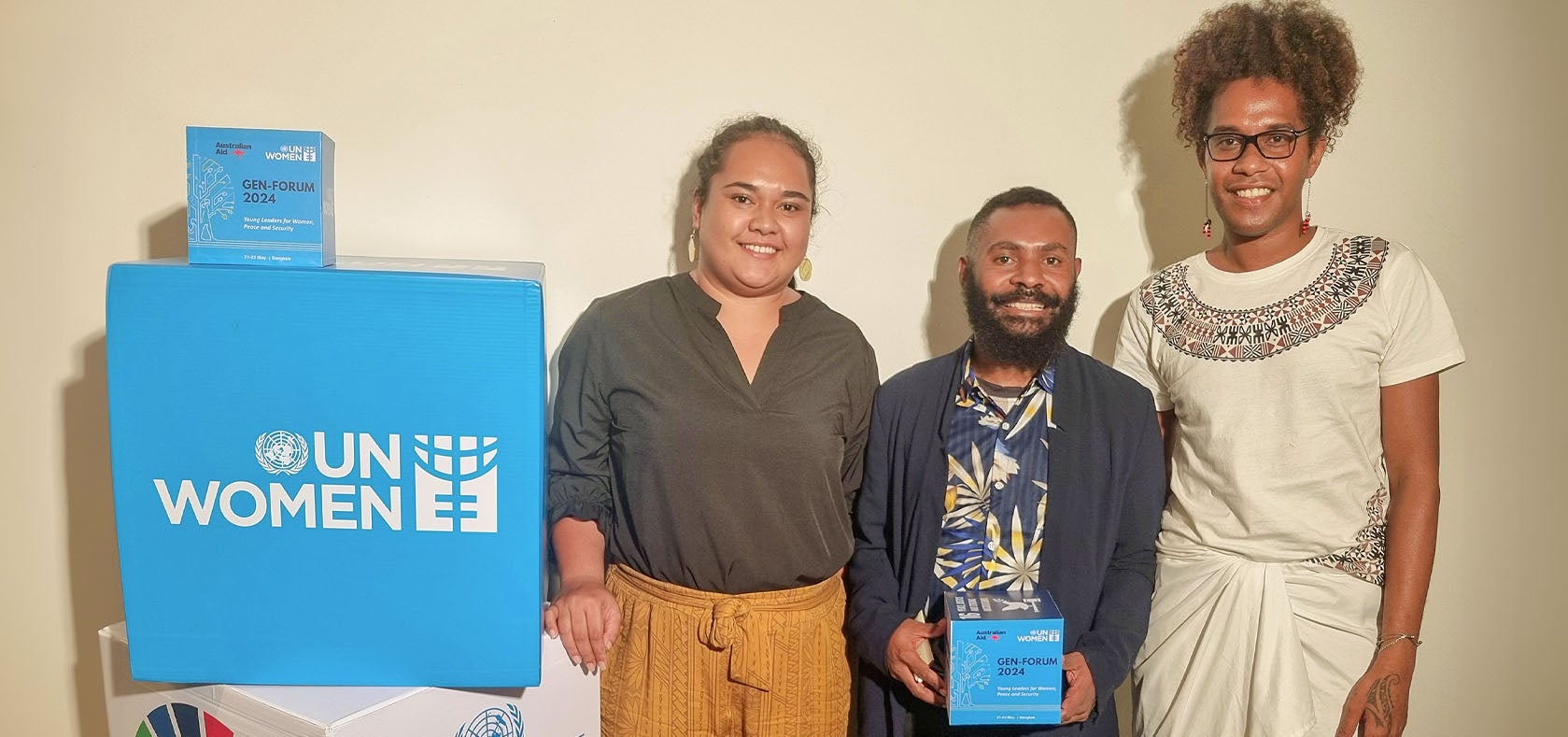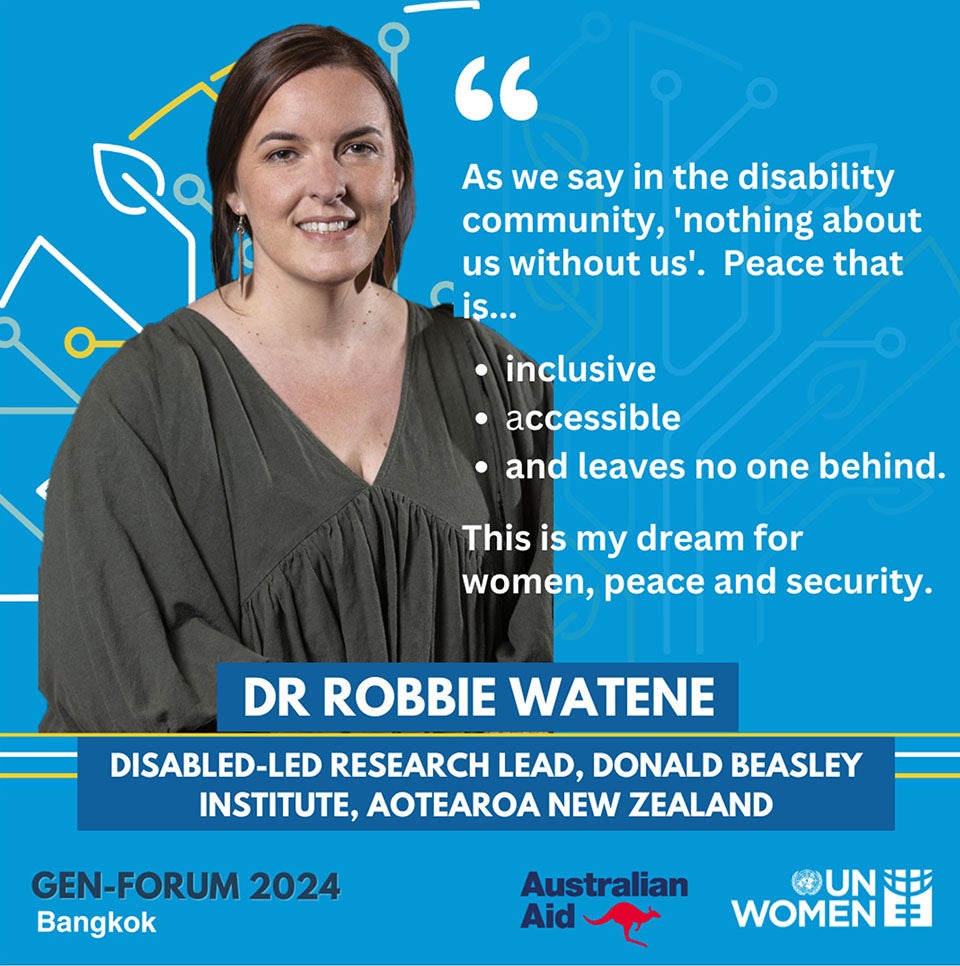Gen-Forum 2024: Pacific voices contribute to youth-led outcomes on women, peace and security
Date:

The perspectives of young people from the Pacific region are reflected in youth-led recommendations to advance the Women, Peace and Security agenda in Asia and the Pacific, following a regional conference hosted by UN Women earlier this year.
Participants from Fiji, New Zealand, Papua New Guinea and Samoa are among the 25 youth champions who have shaped six recommendations and related action points contained in the newly-released Strategic Outcome Document for Gen-Forum 2024: Young Leaders for Women, Peace and Security in Asia and the Pacific.
The recommendation to empower young leaders to address the nexus of women, peace and security and climate change is of particular interest.
“A lot of work has been done by feminists, including Pacific feminists, in terms of women, peace and security, now more than ever because of the climate crisis that is affecting many in Fiji and other Pacific Island countries and territories. As Global South feminists, we don't see climate change as a single issue but one that is intersectional and interlinked, because its impacts are woven into many fabrics of our society and our lived experiences,” explained Tamani Rarama, a Projects Officer at DIVA for Equality, Fiji.
Held in Bangkok in May, Gen-Forum 2024 brought together a rising generation of women, peace and security advocates to examine regional peace and security challenges and to outline new and emerging security issues that matter most to young people in the region.
The recommendation to advance youth leadership in women, peace and security resonates with Manuel Kuria, a Family and Community Studies Tutor at the University of Goroka, Papua New Guinea, who said that taking part in Gen-Forum has broadened his understanding of how conflict can impact women and girls in other parts of the region, enabling him to share this learning with youth networks back home.
“For as long as payback is the norm in the PNG highlands, we will continue to have tribal fights, and women and girls are being badly affected. By forming many new connections at Gen-Forum with other young people from different walks of life and lived experiences, I’ve gained more knowledge and it has moved me. We have a big youth population in PNG and I’m passionate about helping people in my sphere of influence. Now I have gained many new connections who I can call on for support and information,” he said.
Ensuring the meaningful participation and inclusion of young people with lived experience of intersectionality is another key recommendation.
“When the most affected, and those at the intersections of marginalisation, are supported to come together, great things happen. Women, gender minorities, migrant and refugee communities, indigenous, queer, young and disabled people. Why? Because we know what it means to exist on the fringes. We know how to navigate environments, systems and policies that weren’t designed for us. We are problem solvers,” stated Dr Robbie Watene, Disabled-Led Research Lead at the Donald Beasley Institute, New Zealand.

“The thing for me from Gen-Forum is definitely having the voices of the Pacific heard on our experiences related to women, peace and security. There’s so much going on, and I think every experience matters at some level. So, while it may be not as much as what someone else is going through, I think it is good to let people hear from Pacific Islanders,” said Telefina Sio, Youth Ambassador for the Samoa Recycling and Waste Management Association.
Further recommendations contained in the outcome document include empowering young leaders to advance women, peace and security in the digital world, promoting the engagement of young women, peace and security leaders in preventing violent extremism and integrating women, peace and security principles and the voices of young leaders into other emerging issues, such as outer space governance.
The youth recommendations are already contributing to global and regional processes on peacebuilding and sustaining peace, such as a recent Peacebuilding Architecture Review consultation hosted by the Government of the Republic of Korea, and Beijing+30.
The regional forum was organized by UN Women in partnership with the Australian Government to implement commitments under the Regional Framework Towards Peaceful, Inclusive Societies in the Asia-Pacific Region.
More information